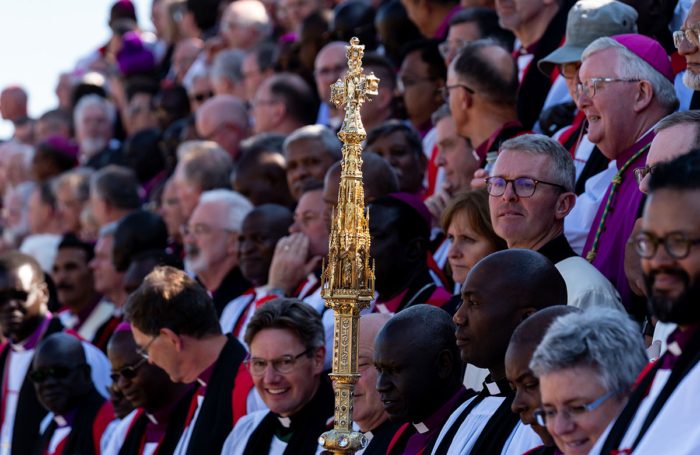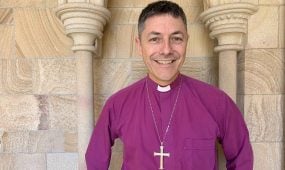Lambeth Conference of Bishops opens Phase 3 to all Anglicans, with initial focus on discipleship
Resources & Research
Anglicans around the world are invited to engage with some of the same issues that more than 650 Anglican bishops contemplated and discussed with each other at last year’s Lambeth Conference, starting with the theme of discipleship, as Phase 3 materials are released

Anglicans around the world are invited to engage with some of the same issues that more than 650 Anglican bishops contemplated and discussed with each other at last year’s Lambeth Conference, starting with the theme of discipleship, as Phase 3 materials are released this week in the Lambeth Calls process.
The Lambeth Conference of Anglican Bishops typically is convened once a decade by the archbishop of Canterbury. The 15th Lambeth Conference was delayed partly due to the pandemic and took place in phases: The first was a listening phase, in which bishops met online in the year leading up to the in-person conference. During the second phase, bishops gathered in July and August 2022 in Canterbury, England, for fellowship, Bible studies and to discuss the draft Lambeth Calls on 10 topics like “safe church” practices, ecumenical and interfaith relations, the environment and sustainable development.
Phase 3 will span three years through 2025, with a new theme introduced about every three months. With each new release, all Anglicans are encouraged “to add their voice to the call.”
“Meeting with our sisters and brothers around the world for the Lambeth Conference in Canterbury last year was a wonderful celebration of our global Anglican family,” Archbishop of Canterbury Justin Welby said in written statement for the May 30 release of the completed Lambeth Calls document. “Phase 3 is all about building on our relationships and conversations, sharing the Lambeth Calls and inviting broad participation from Anglicans all around the world.”
The public portion of Phase 3 began last week with two webinars led by Central America Archbishop Julio Murray of Panama, who chaired the Lambeth Conference Phase 3 Steering Group.
“We have some important work to carry forward into the life of the Anglican Communion,” Murray said in the Phase 3 news release. “The Lambeth Calls are not intended as resolutions or ‘orders’ to be imposed. They are being offered as calls or invitations that can be explored together in a way that strengthens our life as an Anglican Communion.”
Advertisement
The Episcopal Church was represented on the steering group by Caroline Bauerschmidt, wife of Tennessee Bishop John Bauerschmidt. She and an estimated 480 other spouses attended the conference in England, though Welby chose not to invite several spouses of gay and lesbian bishops. (The Rev. Justin Holcomb, bishop-elect in the Diocese of Central Florida, also served the Phase 3 Steering Group as one of three resource consultants.)
The Anglican Communion spans 165 countries and is made up of 42 autonomous yet interdependent churches that all have historic roots in the Church of England. The Lambeth Conference is one of four Instruments of Communion. The others are the Anglican Consultative Council, the Primates’ Meeting and the archbishop of Canterbury, known as a “focus of unity.”
The Anglican Consultative Council, the only Anglican Communion structure that includes laity, met in February 2023 in Accra, Ghana. The next Primates’ Meeting is set for spring 2024 in Rome, Italy.
Last summer, bishops from 39 of the Anglican Communion’s 42 provinces came together at the Lambeth Conference to examine some of the most pressing issues in the world, including climate change, interfaith relations, care for refugees and the threat of anti-democratic movements.
Advertisement
Leaders of the provinces of Nigeria, Uganda and Rwanda chose not to send their bishops to the conference, reflecting their ongoing withdrawal from Anglican Communion structures in protest of other provinces’ progressive stances on LGBTQ+ inclusion, including The Episcopal Church.
Other conservative bishops from what is known as the Global South, where a majority of the world’s 85 million Anglicans live, particularly in Africa and Asia, said one of their top priorities in attending the Lambeth Conference was to demonstrate official majority support for anti-LGBTQ+ stances on marriage and sexuality.
The final Lambeth Calls document reflects those stances but does not meet the Global South bishops’ demand for a clear statement of opposition to same-sex unions – the most divisive issue among the bishops last year in Canterbury.
The Lambeth Conference addressed issues of gender and sexuality in the Lambeth Call on Human Dignity. The document, in addition to confronting injustices tied to racism, colonialism and poverty, emphasizes a resolution from the 1998 Lambeth Conference that said, “All baptized, believing and faithful persons, regardless of sexual orientation, are full members of the Body of Christ.”
“Prejudice on the basis of gender or sexuality threatens human dignity,” the Lambeth Call on Human Dignity says. “There is disagreement and a plurality of views on the relationship between human dignity and human sexuality. Yet, we experience the safeguarding of dignity in deepening dialogue.”
Episcopal bishops said at last year’s conference they were encouraged by the acknowledgement of a plurality of views. The Lambeth Call on Human Dignity, while noting that many Anglican provinces oppose same-sex marriage, also says “other provinces have blessed and welcomed same sex union/marriage after careful theological reflection and a process of discernment.”
A wider Phase 3 discussion of the Lambeth Call on Human Dignity, however, isn’t scheduled until fall 2024.
The current focus is on the Lambeth Call on Discipleship. It says, in part: “We the bishops assembled at the Lambeth Conference, in this Season of Intentional Discipleship, commit ourselves to learn and learn again the loving, liberating and life-giving way of Jesus Christ in every aspect of our lives, through prayer, Word and sacrament, with the strength that God supplies, so that our following of him may be renewed by the Holy Spirit and that the people of our dioceses may be encouraged to do the same.”
Several bishops and other clergy and lay leaders from across the Anglican Communion participated in the May 24 and 25 webinars to introduce Phase 3 and to highlight the Lambeth Call on Discipleship. The Rev. Stephanie Spellers, The Episcopal Church’s canon to the presiding bishop for evangelism, reconciliation and creation care, was a guest in the May 24 webinar.
“Discipleship in the life of Christ is an ongoing, learning journey,” Spellers said. “It’s not that we suddenly master Christianity and can check a box and keep on moving. Our tradition says that we are constantly in formation, we are constantly sanctifying, we are constantly growing into the full stature of Christ.”
To participate in Lambeth Calls, all Anglicans are invited to read the document on discipleship, deepen their understanding of the call, such as by organizing Bible studies around that theme, and then share what the theme looks like in the their local contexts, through a form on the Lambeth Conference website.
Bishop Anthony Poggo, secretary general of the Anglican Communion, said during the webinars that discipleship was a great place to start the discussion of the Lambeth Calls.
“Phase 3 of the Lambeth Conference is for everyone, and it will be an exciting journey, which provides opportunities to learn from one another,” he said.
The next webinars are scheduled for Sept. 20 and 21 to focus on the Lambeth Call on the Environment and Sustainable Development.
First published on the Episcopal News Service website on 30 May 2023.





